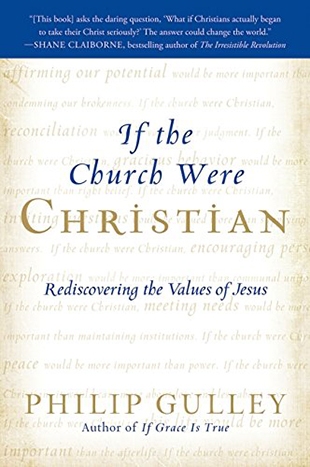Philip Gulley is a Quaker minister and writer. He hosts Porch Talk on the Emmy Award-winning Indiana PBS affiliate WFYI show "Across Indiana." In this challenging book, Gulley points out that the staggering number of Christian denominations, the rise of biblical criticism, and the diminishing authority of the church and the Bible have made it impossible to proclaim a universal understanding of what it means to be a Christian. For many seekers, the church has lost its way, especially when the major discernible proof of faith is being a nice person or holding to a rigid and inhospitable set of doctrines. Gulley's book envisions what the church might look like if it incarnated the values of Jesus.
The traditional understandings of the faith depicted Jesus' divine origins, miracle-working power, and moral perfection which led to worship of him as the divine Son of God. Belief is all important. Gulley wants us to consider what the church would be like if more Christians modeled their lives after Jesus, embodying his love, compassion, hospitality and forgiveness.
A second question to think about is what it would mean if the church affirmed our potential rather than condemned our brokenness? We all are familial with the toxic fallout in so many lives thanks to the the institutional church hammering home the doctrine of original sin and messages about guilt, shame, and fear. Gulley offers another approach:
"The church true to the spirit of Jesus is the church that can see beyond human sin, speak to our deep hunger for mercy and redemption, and give us a vision for all the glory and goodness we could be."
Many have turned away from Christian churches because of their constant accent on judgment, blame, and exclusion. Try to imagine what faith communities would be like if reconciliation and inclusion trumped judgment and condemnation. Many adult-education classes in Christian churches emphasize right belief and adherence to traditional doctrines. Gulley advocates for a Christian community where good questions are valued more than answers. Under this paradigm, leaders are "not to administrate a museum, but to create an environment conducive to human growth and transformation." Closely connected to this proposition is the hope of establishing churches where personal exploration would be more important than communal uniformity.
In the last four chapters, Gulley presents his thoughts on what the church would look like if it took its cues from the life, values, and example of Jesus. Meeting human needs would replace the goal of maintaining the institution; redemptive peace would take precedent over authoritarian power. The church would care more about love and less about sex; saving the earth would be a mission rather than saving our souls.
Gulley has done a fine job pinpointing the flaws of the Christian churches and suggesting transformative paths to follow. His closing plea is for living out "the priorities of Jesus — human dignity, spiritual growth, moral evolution, and the ongoing search for truth and meaning."
